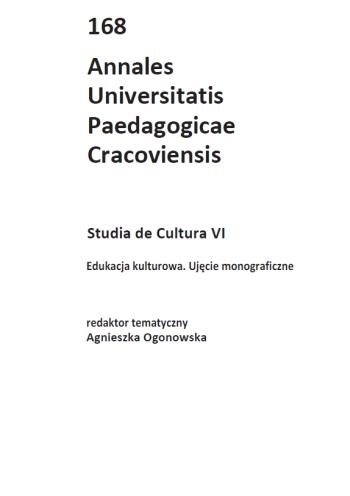Abstract
Television education as a form of cultural education (psychological approach)
The purpose of this article is to show the need for television competence development in various forms of home education. This issue is shown in the perspective of psychology of child development, mainly social, emotional, cognitive and linguistic aspects of the process. A separate space has been devoted to defining what a television education is and what are its basic components. These issues are illustrated with concrete examples.
References
Bettelheim B. (2010), Cudowne i pożyteczne. O znaczeniach i wartościach baśni, Warszawa.
View in Google Scholar
Cyfrowa przyszłość. Katalog kompetencji medialnych i informacyjnych, http://nowoczesnapolska.org.pl (dostęp: 12.12.2013).
View in Google Scholar
Godzic W. (1999), Telewizja jako kultura, Kraków.
View in Google Scholar
Kerckove D. de (1996), Powłoka kultury. Odkrywanie nowej elektronicznej rzeczywistości, Warszawa.
View in Google Scholar
Lemish D. (2008), Dzieci i telewizja. Perspektywa globalna, Kraków.
View in Google Scholar
Ogonowska A. (2009), Telewizja w edukacji medialnej, Kraków.
View in Google Scholar
Ogonowska A. (2013), Edukacja medialna. Obraz i rzeczywistość, Kraków.
View in Google Scholar
J.M.P. Tornero, T. Varis (2010), UNESCO Institute for Information Technologies in Education, Russian Federation.
View in Google Scholar
Rorty A. (1976), A literary postscript: characters, persons, selves, individuals, [w:] The identities of persons, red. A.O. Rorty, Berkley, Los Angeles, London.
View in Google Scholar
Spitzer M. (2013), Cyfrowa demencja. W jaki sposób pozbawiamy rozumu siebie i swoje dzieci, tłum. A. Lipiński, Słupsk.
View in Google Scholar
Wiek ekranów. Przestrzenie kultury widzenia (2002), red. A. Gwóźdź, P. Zawojski, Kraków.
View in Google Scholar
Vasta R., Haith M.M., Miller S.A. (1995), Psychologia dziecka, Warszawa.
View in Google Scholar

